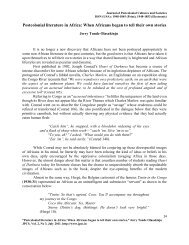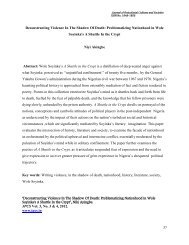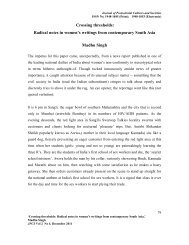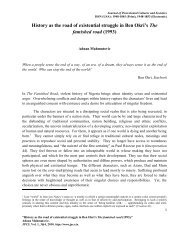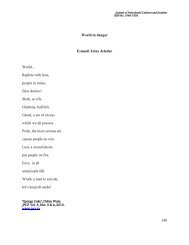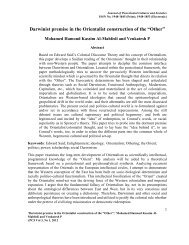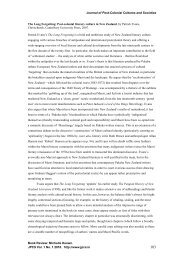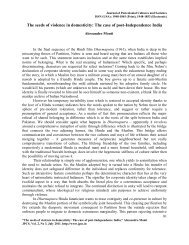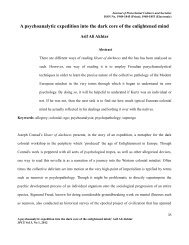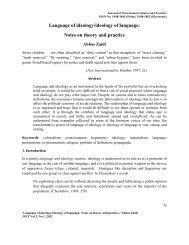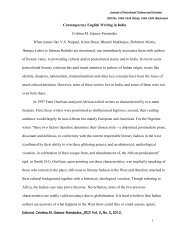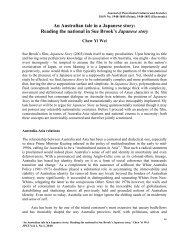Ancient Promises : A Diasporic Contextualisation of the ... - JPCS
Ancient Promises : A Diasporic Contextualisation of the ... - JPCS
Ancient Promises : A Diasporic Contextualisation of the ... - JPCS
You also want an ePaper? Increase the reach of your titles
YUMPU automatically turns print PDFs into web optimized ePapers that Google loves.
Journal <strong>of</strong> Postcolonial Cultures and SocietiesISSN No. 1948-1853<strong>Ancient</strong> <strong>Promises</strong> : A <strong>Diasporic</strong> <strong>Contextualisation</strong> <strong>of</strong> <strong>the</strong> Second GenerationAbitha BalagopalanAbstract: This paper seeks out to explore how Jaishree Misra‟s novel <strong>Ancient</strong> <strong>Promises</strong>positions <strong>the</strong> protagonist Janaki as <strong>the</strong> unspoken and invisible “o<strong>the</strong>r” by <strong>the</strong> dominantdiscourses <strong>of</strong> <strong>the</strong> society. By acknowledging Janaki as a dislocated “o<strong>the</strong>r”, <strong>the</strong> paper tries tointerrogate <strong>the</strong> various interimplications <strong>of</strong> marginalisation and displacement <strong>of</strong> <strong>the</strong> protagonistin <strong>the</strong> narrative, caused by her c<strong>of</strong>ounding in-between identity. Again, through an appraisal <strong>of</strong><strong>the</strong> ambivalent stance <strong>of</strong> <strong>the</strong> protagonist to <strong>the</strong> essentialised notions <strong>of</strong> identity, morality, homeand belongingness, <strong>the</strong> paper considers <strong>the</strong> narrative as a unique piece that touches withdisconcerting openness on <strong>the</strong> issues <strong>of</strong> strained caste, class and gender relations in Kerala. Thepaper views <strong>the</strong> novel as a seminal text that expounds on <strong>the</strong> strange adulation for upper castecustoms and practices, which <strong>the</strong> protagonist in this novel internalises in a very self-consciousmanner.Keywords: diaspora, identity, <strong>Ancient</strong> <strong>Promises</strong>, Janaki, Kerala.‘<strong>Ancient</strong> <strong>Promises</strong> : A <strong>Diasporic</strong> <strong>Contextualisation</strong> <strong>of</strong> <strong>the</strong> Second Generation’,Abitha Balgopalan.<strong>JPCS</strong> Vol. 3, No. 3 & 4, 2012.www.jpcs.in83
Journal <strong>of</strong> Postcolonial Cultures and SocietiesISSN No. 1948-1853<strong>Ancient</strong> <strong>Promises</strong> : A <strong>Diasporic</strong> <strong>Contextualisation</strong> <strong>of</strong> <strong>the</strong> Second GenerationAbitha Balagopalan“Diaspora does not simply refer to geographical dispersal but also to <strong>the</strong> vexedquestions <strong>of</strong> identity, memory and home which such displacement produces.”(Aschcr<strong>of</strong>t,2002: 217-218).A rethinking <strong>of</strong> <strong>the</strong> status <strong>of</strong> <strong>the</strong> diaspora may have to start with an acknowledgement <strong>of</strong><strong>the</strong> fact that, though <strong>the</strong> postmodern \ postcolonial writers have always embraced <strong>the</strong> idea <strong>of</strong> <strong>the</strong>formation <strong>of</strong> new and speculative hybrid identities, <strong>the</strong> question <strong>of</strong> <strong>the</strong> constantly changingsubject positions <strong>of</strong> <strong>the</strong> diasporic community has challenged at least some <strong>of</strong> <strong>the</strong>m. Theprospect <strong>of</strong> a geographically and ontologically fluid identity, formed not only by disrupting <strong>the</strong>binaries <strong>of</strong> <strong>the</strong> local and <strong>the</strong> global, but also by problematizing national, racial and ethnicformulations, is central to most <strong>of</strong> <strong>the</strong> diasporic writings. It is thus not surprising to seeenlightening postcolonial interpretations <strong>of</strong> <strong>the</strong> unnatural and awful treatment <strong>of</strong> <strong>the</strong> secondgeneration diaspora by <strong>the</strong> dominant discourse which <strong>of</strong>ten mask, occlude, alienate and disown<strong>the</strong>ir hyphenated identities. In a discussion on postcolonialism, Aschcr<strong>of</strong>t et al., for instance,note that hybrid forms are always regarded as „<strong>the</strong> o<strong>the</strong>r‟ which is radically different from „<strong>the</strong>self‟ and a simultaneous proposition suggests that authority is maintained over <strong>the</strong>m even as<strong>the</strong>re has been a deliberate attempt to destroy or marginalize <strong>the</strong>ir very presence. This argumentis supported by a recent approach in cultural studies that traces <strong>the</strong> unproblematic andconfounding nature <strong>of</strong> <strong>the</strong> cultural identity <strong>of</strong> <strong>the</strong> in-betweens, which, as <strong>the</strong> cultural<strong>the</strong>oretician Stuart Hall puts it, “… is never complete, always in process, and alwaysconstituted within, not outside, representation.”(Hall, 1990:222).‘<strong>Ancient</strong> <strong>Promises</strong> : A <strong>Diasporic</strong> <strong>Contextualisation</strong> <strong>of</strong> <strong>the</strong> Second Generation’,Abitha Balgopalan.<strong>JPCS</strong> Vol. 3, No. 3 & 4, 2012.www.jpcs.in84
Journal <strong>of</strong> Postcolonial Cultures and SocietiesISSN No. 1948-1853Behind Stuart Hall‟s use <strong>of</strong> <strong>the</strong> term and his analysis <strong>of</strong> identity as not transparent andunproblematic, lie an echo <strong>of</strong> modern and postmodern <strong>the</strong>orizations and <strong>the</strong> political energy thathas crystallized around <strong>the</strong> question <strong>of</strong> identity since <strong>the</strong> 1800s. Many <strong>the</strong>orists have concurredthat <strong>the</strong> four forms <strong>of</strong> identity extremely influential <strong>the</strong>se days, namely race, class, nationalityand sexuality, emerged along with, and as products <strong>of</strong>, modernity. It is possible to discern <strong>the</strong>roots <strong>of</strong> <strong>the</strong> concept <strong>of</strong> “race” in <strong>the</strong> anthropological writings <strong>of</strong> Kant, while <strong>the</strong> concept <strong>of</strong>“class” owes its origin to capitalism, “nationality” to that <strong>of</strong> <strong>the</strong> development <strong>of</strong> <strong>the</strong> nation state,and sexuality to <strong>the</strong> creation <strong>of</strong> alternative communities. After a detailed analysis <strong>of</strong> <strong>the</strong> pathbreaking<strong>the</strong>oretical work on identity by various thinkers such as Hegel, Marx, Freud, Mead etc.,Linda Martin Alc<strong>of</strong>f, observes in an introduction to a volume titled Identities: Race ,Class,Gender and Nationality that, despite <strong>the</strong>ir differences, <strong>the</strong>se thinkers opened <strong>the</strong> door to <strong>the</strong>questions <strong>of</strong> identity by rejecting <strong>the</strong> notion that selves have an independence outside <strong>the</strong> socialdomain , <strong>the</strong>reby once again establishing <strong>the</strong> idea that „identities are essentially social objects,gaining <strong>the</strong>ir intelligibility and force only within a social realm‟.(Alc<strong>of</strong>f, 2003:4). So defined in<strong>the</strong> works <strong>of</strong> Stuart Hall, Linda Martina Alc<strong>of</strong>f, Bill Ashcr<strong>of</strong>t and o<strong>the</strong>rs, <strong>the</strong> question <strong>of</strong> culturalidentity <strong>of</strong> <strong>the</strong> diaspora serves a position <strong>of</strong> magnified significance in <strong>the</strong> present climate <strong>of</strong>postcolonial and postmodern polemics that deliver heated debates on national, cultural, ethnicand religious identities. Therefore, not surprisingly, <strong>the</strong> figure <strong>of</strong> <strong>the</strong> „culturally contaminated‟second generation diaspora, caught in a historical limbo between <strong>the</strong> home and <strong>the</strong> world, lies at<strong>the</strong> heart <strong>of</strong> <strong>the</strong> recent spate <strong>of</strong> post colonial fictions in contemporary India. (Gandhi, 1998:132).This is not to suggest that fiction in cultural domain follows <strong>the</strong>ory, but that both inhabit <strong>the</strong>similar terrain on that both are informed by similar tendencies/concerns.However, an understanding <strong>of</strong> diasporic deconstructions <strong>of</strong> identity may have to start bycreating a mutually accountable dialogue for those hybrid identities that totalizes heterogenous“selves” and subjectivities. With <strong>the</strong> dominant paradigm <strong>of</strong> nationalist identity as part <strong>of</strong> animagined community, avant-garde <strong>the</strong>orists <strong>of</strong>ten view diasporic identities as a decapitation <strong>of</strong>‘<strong>Ancient</strong> <strong>Promises</strong> : A <strong>Diasporic</strong> <strong>Contextualisation</strong> <strong>of</strong> <strong>the</strong> Second Generation’,Abitha Balgopalan.<strong>JPCS</strong> Vol. 3, No. 3 & 4, 2012.www.jpcs.in85
Journal <strong>of</strong> Postcolonial Cultures and SocietiesISSN No. 1948-1853<strong>the</strong> subject and a permanent retirement from identitarian forms <strong>of</strong> thinking and belonging. Thus,contemporary hybrid identity <strong>of</strong> <strong>the</strong> diaspora, as post colonial <strong>the</strong>orist R.Radhakrishnan writesachieves its entitlement through “a choice between <strong>the</strong> violent history <strong>of</strong> colonialism and <strong>the</strong>indigenous genealogy that existed prior to <strong>the</strong> colonial era.” This argument also echoes <strong>the</strong>challenges felt by expatriates in constructing <strong>the</strong>ir identities in a nationalist framework. In someinstances, a recognition <strong>of</strong> diasporic identity as a pre-condition for a particular class <strong>of</strong> excolonizedpeople involving access to greater educational and economic opportunities may raise<strong>the</strong> concerns <strong>of</strong> class as an important issue <strong>of</strong> identity studies. Similarly, <strong>the</strong> play <strong>of</strong> identity anddifference in diasporic studies constructs ethnic identity as a fundamental category withinidentity studies. Ethnicity, <strong>of</strong>ten coupled with diasporic identity and hybridity, implies a sense <strong>of</strong>belongingness, founded on an attachment to an actual or possible homeland, its cultural heritage,belief systems, political history, language, characteristic myths, customs, manners, food, sports,literature, art or architectural style. Based on perceived differences between a given identity andthat <strong>of</strong> a dominant culture, <strong>the</strong> ethnic identity emerges with contemporary emphasis in <strong>the</strong>formation <strong>of</strong> migrant and hybrid identities.Most <strong>of</strong> <strong>the</strong> diasporic writings <strong>of</strong> <strong>the</strong> period are written against a back drop <strong>of</strong> <strong>the</strong> brutaland inhuman o<strong>the</strong>ring <strong>of</strong> <strong>the</strong> seemingly silent and marginalized masses <strong>of</strong> expatriates who havebeen dispersed or who have migrated across national boundaries. Published in <strong>the</strong> year 2000,Jiashree Misra‟s semi-autobiographical novel, <strong>Ancient</strong> <strong>Promises</strong> is certainly one such story <strong>of</strong>displacement and disruption, despite its romantic overtones, as it charts both <strong>the</strong> complex andambivalent traumas <strong>of</strong> self- depreciation <strong>of</strong> <strong>the</strong> protagonist and <strong>the</strong> lamented horrors <strong>of</strong> hybridcultural identity <strong>of</strong> <strong>the</strong> second generation diaspora by <strong>the</strong> dominant discourses <strong>of</strong> <strong>the</strong> society.Along with <strong>the</strong> issue <strong>of</strong> representing and redefining <strong>the</strong> protagonist Janaki as a postmodernfloating signifier, <strong>the</strong> novel also talks about <strong>the</strong> process <strong>of</strong> negotiating human relationships thathave been foundered and are irrevocably damaged. A fur<strong>the</strong>r implication, however, dependsupon detecting <strong>the</strong> symbolic and ideological meanings in superficial glamorous trappings <strong>of</strong> <strong>the</strong>‘<strong>Ancient</strong> <strong>Promises</strong> : A <strong>Diasporic</strong> <strong>Contextualisation</strong> <strong>of</strong> <strong>the</strong> Second Generation’,Abitha Balgopalan.<strong>JPCS</strong> Vol. 3, No. 3 & 4, 2012.www.jpcs.in86
Journal <strong>of</strong> Postcolonial Cultures and SocietiesISSN No. 1948-1853upper class Nair life, and <strong>the</strong> fake core beneath, where women are disregarded, oppressed andsilenced. An awareness <strong>of</strong> <strong>the</strong> displaced figure <strong>of</strong> Janaki, caught between tradition andmodernization, <strong>the</strong>refore, encourages a reading that <strong>the</strong> sanctified norms <strong>of</strong> a patriarchal culturein Keralam (sou<strong>the</strong>rn most state <strong>of</strong> <strong>the</strong> Indian subcontinent) prefers docile, yet educated, womenwho become <strong>the</strong> perfect knick knack <strong>of</strong> <strong>the</strong> mantle piece <strong>of</strong> <strong>the</strong>ir husbands while o<strong>the</strong>rs arerelegated to <strong>the</strong> periphery.(Spivak,1988:306).One question that comes up several times in this novel is “what is <strong>the</strong> identity <strong>of</strong> Janakias an in- between?” Her identity as an „incarcerated expatriate‟ is a complex one that emergesfrom <strong>the</strong> concurrent interplays <strong>of</strong> social roles foisted by dominant narratives as well as by herown interpretation and resistance <strong>of</strong> those societal roles and meanings. Her hybrid consciousnessinforms <strong>the</strong> whole text resulting in existential moments that express <strong>the</strong> up-rootednessexperienced by <strong>the</strong> migrant people. Hence Janaki‟s observation that , “Survival was one thinghalf way children were good at, hopping effortlessly back and forth between <strong>the</strong>ir differentidentities . Never quite belonging any where.” supports <strong>the</strong> construction <strong>of</strong> a self that is openended,heterogeneous and negotiable. To assert her identity as a Malayalee and a daughter-inlaw<strong>of</strong> Marars, Janaki not only has to live in Keralam, formally belonging to <strong>the</strong> Mararhousehold, she has also to feel that this belonging is real. However, <strong>the</strong> Marar household turnsout to be a source <strong>of</strong> alienation and suffering for her as she sadly comments,What was I doing here, lying on somebody‟s foam-mattress bed that smelt <strong>of</strong> shopnew latex, on such a frighteningly clean sheet?....Tears that I‟d managed to stave<strong>of</strong>f all day, in some desperate bid to seem in control, were now rolling down <strong>the</strong>sides <strong>of</strong> my face, making <strong>the</strong> insides <strong>of</strong> my ear go squishy wet. I desperatelyneeded to see my parents and tell <strong>the</strong>m <strong>the</strong>ir dream wasn‟t panning out too wellfor me. To ask <strong>the</strong>m to get me out, to take me back.” ( Misra,2000:16-17).‘<strong>Ancient</strong> <strong>Promises</strong> : A <strong>Diasporic</strong> <strong>Contextualisation</strong> <strong>of</strong> <strong>the</strong> Second Generation’,Abitha Balgopalan.<strong>JPCS</strong> Vol. 3, No. 3 & 4, 2012.www.jpcs.in87
Journal <strong>of</strong> Postcolonial Cultures and SocietiesISSN No. 1948-1853Much <strong>the</strong> same might be said about <strong>the</strong> assaults on her linguistic peculiarities, as <strong>the</strong> inlawsviewed her „Delhi- English‟ as an instance <strong>of</strong> her unstable double consciousness. Strictlyembedded in power relations, it is crucial to address <strong>the</strong> linguistic hierarchies present in <strong>the</strong>Maarar family as an effect <strong>of</strong> <strong>the</strong> consumption and representation <strong>of</strong> a neocolonialist discoursewhich on <strong>the</strong> one hand privileges an English educated bride so that her husband “could take herto Bombay in <strong>the</strong> hoped-for expansion <strong>of</strong> his motel business” and on <strong>the</strong> o<strong>the</strong>r dislodges herwestern articulations/mannerisms to <strong>the</strong> margins. While exploring how language encodes powerrelations <strong>the</strong> Marxian thinker Gramsci observes that language conveys power differences whichbecome apparent in <strong>the</strong> attempt <strong>of</strong> <strong>the</strong> dominant class to create a common cultural climatethrough <strong>the</strong> imposition <strong>of</strong> a national language. In <strong>the</strong> novel <strong>the</strong> situation is a reversion <strong>of</strong> <strong>the</strong> role<strong>of</strong> <strong>the</strong> post colonial whereby <strong>the</strong> in-laws who see <strong>the</strong>mselves without any „assumption <strong>of</strong> nativebackwardness‟ scrutinizes and objectifies <strong>the</strong> hybrid position and language <strong>of</strong> Janaki as badges<strong>of</strong> failure or denigration. Hence hearing <strong>the</strong> callous speech <strong>of</strong> her mo<strong>the</strong>r-in-law Janaki wonders:“Was her displeasure because I‟d spoken in English? …. Non-Kerala families like minetended to mix up English and Malayalam into an easy, casual city-speech that hadworked reasonably well on my holidays here. Now that I was here for ever, it looked likethat brand <strong>of</strong> Malayalam was going to be woefully inadequate . Even worse, seen asstylish.”( Misra,2000:80).Paradoxically enough, English, <strong>the</strong> language <strong>of</strong> <strong>the</strong> masters, acquires a resistant and subversivefunction in <strong>the</strong> Maraar household since Janaki <strong>of</strong>ten uses it against <strong>the</strong> hegemonizing role <strong>of</strong> herin-laws. Unlike <strong>the</strong> o<strong>the</strong>r hybrid characters in <strong>the</strong> diasporic narratives, Janaki shows no longingfor her mo<strong>the</strong>r tongue or homeland, thus complicating <strong>the</strong> „teleology <strong>of</strong>assimilation.‟(Desai,2004:118).Where as her parents depict <strong>the</strong> diasporic desire to return to <strong>the</strong> homeland, Janaki‟sescapade to London in times <strong>of</strong> crisis explains <strong>the</strong> differences in <strong>the</strong> thinking <strong>of</strong> <strong>the</strong> first andsecond generation diaspora. The novel evinces that <strong>the</strong> second generation diaspora cannot‘<strong>Ancient</strong> <strong>Promises</strong> : A <strong>Diasporic</strong> <strong>Contextualisation</strong> <strong>of</strong> <strong>the</strong> Second Generation’,Abitha Balgopalan.<strong>JPCS</strong> Vol. 3, No. 3 & 4, 2012.www.jpcs.in89
Journal <strong>of</strong> Postcolonial Cultures and SocietiesISSN No. 1948-1853Oonk, Gijsbert. “Global Indian Diasporas: Exploring Trajectories <strong>of</strong> Migration and Theory.”Global Indian Diasporas Exploring Trajectories <strong>of</strong> Migration and Theory. (Ed).Gijsbert Oonk.Amsterdam: Amsterdam University Press, 2007.Ponzanesi, Sandra. Paradoxes <strong>of</strong> Post colonial Culture: Contemporary Women Writers <strong>of</strong> <strong>the</strong>Indian and Afro-Italian Diaspora. Albany: State University <strong>of</strong> New York Press, 2004.Rushdie,Salman. Imaginary Homelands: Essays and Criticisms 1981-1991. London: GrantaBooks, 1991.Said, Edward. “Jane Austen and Empire”. Literary Theory: An Anthology. (Ed) Julie Rivkin andMichael Ryan. Australia: Blackwell, 2004.Spivak, Gayatri. “Feminism and Critical Theory.” Modern Criticism and Theory: A Reader. Ed.David Lodge. Delhi : Pearson, 1988.Suleri, Sara. “The Rhetoric <strong>of</strong> English India.” The Post-colonial Studies Reader. (Ed). BillAshcr<strong>of</strong>t, Gareth Griffiths, and Helen Tiffin. London: Routledge, 1995.Biographical noteAbitha Balgopalan is an Assistant Pr<strong>of</strong>essor at <strong>the</strong> Department <strong>of</strong> English, Vimala College, Thrissur,India. She is presently pursuing her Ph.D titled, Paradigms <strong>of</strong> Culture, Caste and Community:Representation <strong>of</strong> Nair Identity in Selected Narratives.‘<strong>Ancient</strong> <strong>Promises</strong> : A <strong>Diasporic</strong> <strong>Contextualisation</strong> <strong>of</strong> <strong>the</strong> Second Generation’,Abitha Balgopalan.<strong>JPCS</strong> Vol. 3, No. 3 & 4, 2012.www.jpcs.in92



